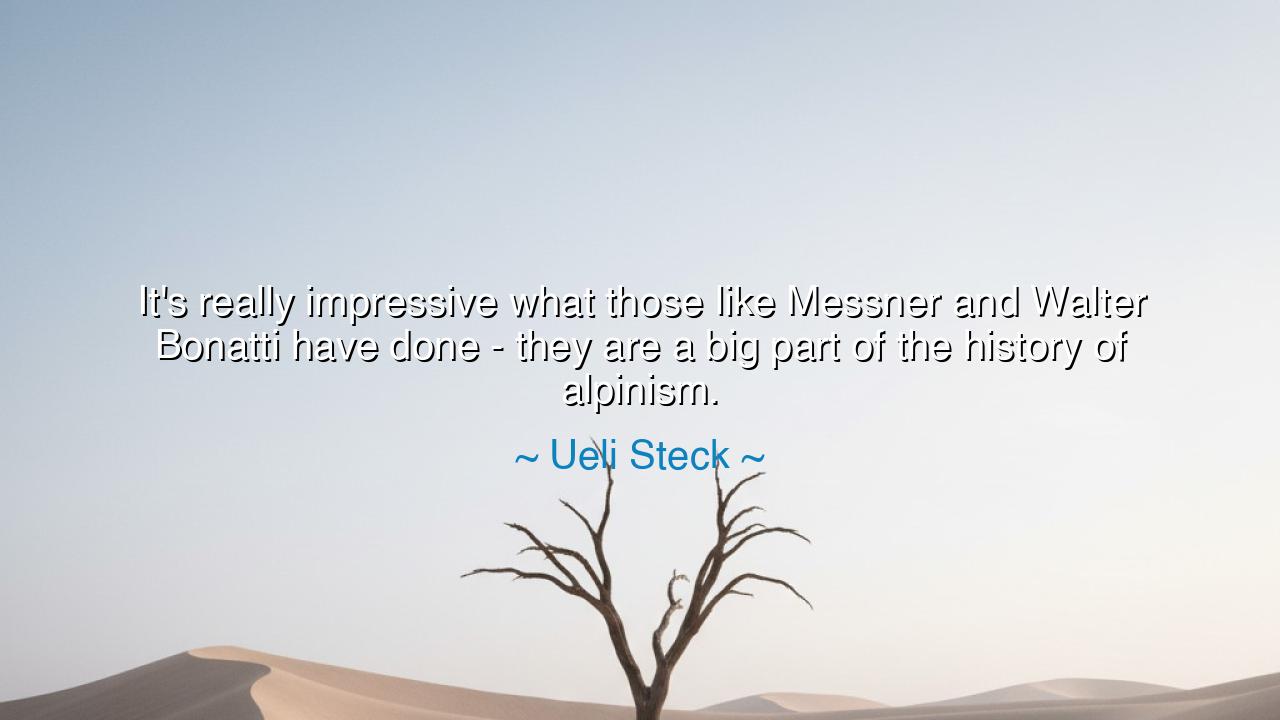
It's really impressive what those like Messner and Walter Bonatti
It's really impressive what those like Messner and Walter Bonatti have done - they are a big part of the history of alpinism.






When Ueli Steck, the “Swiss Machine” of mountaineering, said, “It’s really impressive what those like Messner and Walter Bonatti have done — they are a big part of the history of alpinism,” he was not merely offering praise. He was acknowledging lineage, legacy, and the sacred brotherhood of those who have defied gravity and mortality upon the world’s greatest peaks. In this statement lies both reverence and humility — the recognition that every climber stands upon the shoulders of those who came before, that the mountains remember each soul who dared to touch their silence. Steck, himself a legend, understood that the ascent of one man is never his alone; it is part of a story as ancient and unbroken as the stones of the Alps themselves.
To understand the depth of his words, we must recall who Reinhold Messner and Walter Bonatti were. Messner, the man who first conquered all fourteen of the world’s eight-thousand-meter peaks without supplemental oxygen, and Bonatti, the Italian whose courage and purity of style redefined the ethics of climbing — these men were not just mountaineers; they were philosophers of endurance. They climbed not merely for conquest, but for communion — to test the boundaries of human spirit against the eternity of nature. They did not rely on machines, but on will; not on routes marked safe, but on paths carved from faith and solitude. For them, the mountain was not an enemy to be defeated, but a mirror of the soul.
When Steck spoke these words, he was already a master of speed ascents, a man who had raced up the north faces of the Eiger, the Matterhorn, and Annapurna with almost superhuman grace. Yet even he bowed to the greatness of Messner and Bonatti. This humility reveals the spiritual continuity of alpinism — a tradition where every climber honors those who came before, just as a monk honors his teachers. Steck knew that his daring achievements — his record-breaking climbs, his innovations in lightness and endurance — were the flowering of seeds planted long ago by those men who first reimagined what was possible. His quote is thus not only homage, but confession: we are all heirs to greatness that we did not create, yet must strive to uphold.
The history of alpinism, which Steck invokes, is not written in ink but in ice and wind, in footprints that vanish yet remain eternal in spirit. It began when early climbers looked upon the white peaks and felt the call of something larger than themselves — a call not of ambition, but of revelation. Bonatti once wrote, “Mountains are not fair or unfair, they are dangerous.” Yet it was that danger, that unflinching truth, that drew him upward. Messner followed, stripping away the excess, refusing oxygen, ropes, and sherpas, until what remained was pure — man against mountain, life against eternity. Steck, inheriting that philosophy, carried it into a new century, fusing strength with speed, turning climbing into both art and meditation.
Their lives remind us that the pursuit of greatness is not about glory, but about purity — the willingness to walk where few dare, not for the applause of others, but for the dialogue between soul and nature. When Steck praised his predecessors, he acknowledged that they had preserved this purity when the world was already turning toward comfort and convenience. Messner and Bonatti refused to compromise with safety or spectacle; they climbed not to be admired, but to understand themselves. Their greatness lies not in their summits, but in their solitude — in the courage to face fear without armor.
Yet within this reverence, there is a greater lesson for all who live not among mountains but in the valleys of ordinary life. The spirit of alpinism is not confined to peaks; it dwells in every act of integrity, in every struggle to rise above mediocrity. To climb is to seek clarity — to choose hardship over ease, meaning over distraction. And to honor those who came before, as Steck did, is to live with gratitude: to remember that all progress, whether in art, science, or spirit, is built upon the labor and sacrifice of the brave.
So, O seeker of truth, let the words of Ueli Steck be your compass: remember the giants whose footsteps carved the path before you, but do not merely walk in their shadows — climb beyond, as they would wish you to. Learn from their courage, but find your own summit. Whether your mountain is a dream, a duty, or a burden, face it as they did — with reverence, with discipline, with love. For when you strive with that same purity of purpose, you too become a part of the unending history of human ascent — a quiet flame added to the eternal fire of those who dared to reach for the heights.






AAdministratorAdministrator
Welcome, honored guests. Please leave a comment, we will respond soon